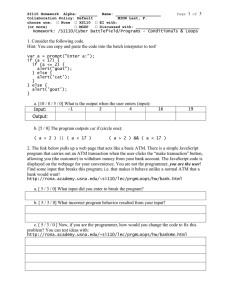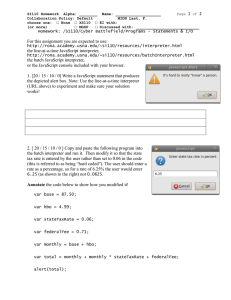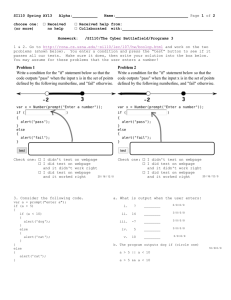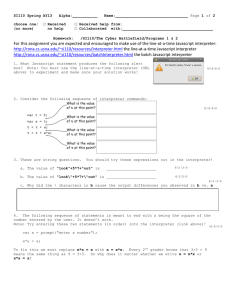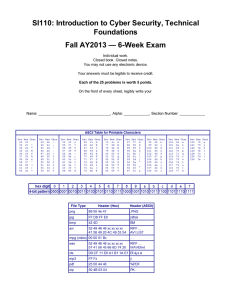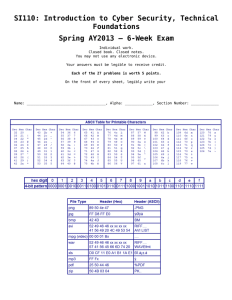SI110 Spring AY13 Alpha:___________ Name:________________________________
advertisement
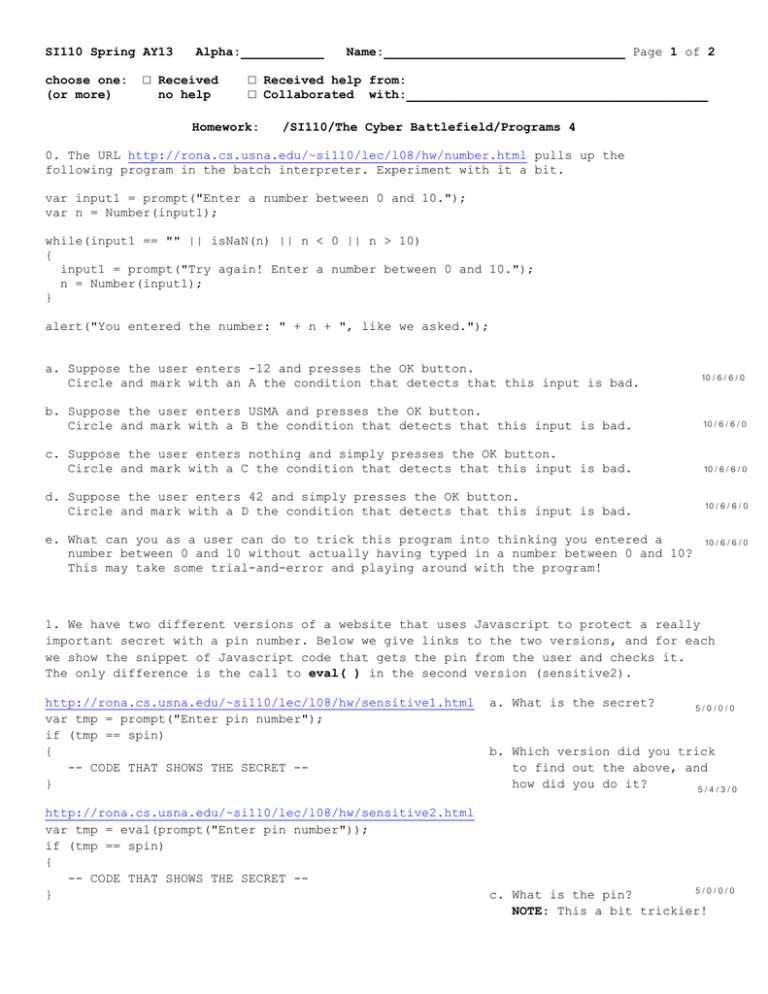
SI110 Spring AY13
choose one:
(or more)
Alpha:___________
□ Received
no help
Name:________________________________ Page 1 of 2
□ Received help from:
□ Collaborated with:________________________________________
Homework:
/SI110/The Cyber Battlefield/Programs 4
0. The URL http://rona.cs.usna.edu/~si110/lec/l08/hw/number.html pulls up the
following program in the batch interpreter. Experiment with it a bit.
var input1 = prompt("Enter a number between 0 and 10.");
var n = Number(input1);
while(input1 == "" || isNaN(n) || n < 0 || n > 10)
{
input1 = prompt("Try again! Enter a number between 0 and 10.");
n = Number(input1);
}
alert("You entered the number: " + n + ", like we asked.");
a. Suppose the user enters -12 and presses the OK button.
Circle and mark with an A the condition that detects that this input is bad.
10 / 6 / 6 / 0
b. Suppose the user enters USMA and presses the OK button.
Circle and mark with a B the condition that detects that this input is bad.
10 / 6 / 6 / 0
c. Suppose the user enters nothing and simply presses the OK button.
Circle and mark with a C the condition that detects that this input is bad.
10 / 6 / 6 / 0
d. Suppose the user enters 42 and simply presses the OK button.
Circle and mark with a D the condition that detects that this input is bad.
10 / 6 / 6 / 0
e. What can you as a user can do to trick this program into thinking you entered a
10 / 6 / 6 / 0
number between 0 and 10 without actually having typed in a number between 0 and 10?
This may take some trial-and-error and playing around with the program!
1. We have two different versions of a website that uses Javascript to protect a really
important secret with a pin number. Below we give links to the two versions, and for each
we show the snippet of Javascript code that gets the pin from the user and checks it.
The only difference is the call to eval( ) in the second version (sensitive2).
http://rona.cs.usna.edu/~si110/lec/l08/hw/sensitive1.html
var tmp = prompt("Enter pin number");
if (tmp == spin)
{
-- CODE THAT SHOWS THE SECRET -}
http://rona.cs.usna.edu/~si110/lec/l08/hw/sensitive2.html
var tmp = eval(prompt("Enter pin number"));
if (tmp == spin)
{
-- CODE THAT SHOWS THE SECRET -}
a. What is the secret?
5/0/0/0
b. Which version did you trick
to find out the above, and
how did you do it?
5/4/3/0
5/0/0/0
c. What is the pin?
NOTE: This a bit trickier!
SI110 Spring AY13
Alpha:___________
Name:________________________________ Page 2 of 2
2. How many coin flips would I have to make to get 20 heads? I’d expect it to take about
40, but the exact number would be up to chance, sometimes taking more than 40, sometimes
less. The program below simulates the process of continually flipping a coin until 20
heads have appeared, and then it reports the number of flips made. Show how to modify
the program so that the target number of heads is input by the user, rather than fixed at
20. You must test your changes in the batch interpreter. To help make that easy, the
following link automatically pulls up the code below in the batch interpreter:
15 / 12 / 8 / 0
http://rona.cs.usna.edu/~si110/lec/l08/hw/flipsHW.html
var numFlips = 0;
var numHeads = 0;
while(numHeads < 20)
{
if (Math.random() < 0.5)
{
numHeads = numHeads + 1;
}
numFlips = numFlips + 1;
}
alert("It took " + numFlips + " coin tosses to get 20 heads!");
2. Check one:
I did not test my answer to Question #2 in the batch interpreter.
I tested my answer to Question #2 in the batch interpreter: it did not work.
I tested my answer to Question #2 in the batch interpreter: it worked.
10 / 6 / 0 / 0
3. Go to http://rona.cs.usna.edu/~si110/lec/l08/hw/secret.html and discover the secret
message. This will probably mean finding some strange input that the programmer didn’t
anticipate and prepare for. Give the secret message and describe how you got it! If you
didn’t actually carry out the attack you need to write that fact down!
10 / 8 / 6 / 0
Page 2 of 2
